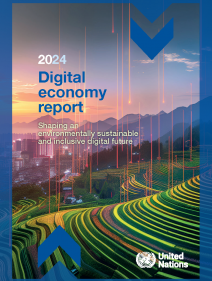The Digital Economy Report 2024: Shaping an Environmentally Sustainable and Inclusive Digital Future highlights the urgent need for sustainable strategies throughout the life cycle of digitalization. From raw material extraction and usage of digital technologies to waste generation, the report explores the nature and scale of the sector’s environmental footprint, which remains largely unassessed. What is apparent is that developing countries are suffering disproportionately from digitalization’s negative environmental effects, as well as missing out on economic developmental opportunities due to digital divides. UNCTAD calls for global policies involving all stakeholders to enable a more circular digital economy and reduced environmental footprints from digitalization, while ensuring inclusive development outcomes. Previous editions of the Digital Economy Report have largely focused on the implications of digitalization for inclusive development, the importance of bridging digital and data-related divides, enabling value creation and capture in developing countries and fostering better governance of data and digital platforms. The Digital Economy Report 2024 turns attention to the environmental footprint of digitalization. The topic is timely, not to say overdue. Digital transformation is taking place in parallel with growing concerns related to the depletion of raw materials, water stress, climate change, pollution, and waste generation, which are all linked to planetary boundaries. The rapid pace and expanding scope of digitalization make it increasingly important to understand the relationship between digitalization and environmental sustainability. How the world’s ongoing digital transformation is managed will greatly influence the future of humanity and the health of the planet.
Share this:
Shaping an environmentally sustainable and inclusive digital future
Release Date:
16 August, 2024
© United Nations Economic Commission for Africa

